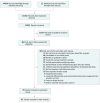Social and Emotional Learning Associated With Universal Curriculum-Based Interventions in Early Childhood Education and Care Centers: A Systematic Review and Meta-analysis
- PMID: 30646283
- PMCID: PMC6324369
- DOI: 10.1001/jamanetworkopen.2018.5727
Social and Emotional Learning Associated With Universal Curriculum-Based Interventions in Early Childhood Education and Care Centers: A Systematic Review and Meta-analysis
Abstract
Importance: Social-emotional competence in early childhood influences long-term mental health and well-being. Interest in the potential to improve child health and educational outcomes through social and emotional learning (SEL) programs in early childhood education and care (ECEC) settings is increasing.
Objective: To conduct a systematic review and meta-analysis of studies examining the social, emotional, and early learning outcomes associated with universal curriculum-based SEL programs delivered to children aged 2 to 6 years in center-based ECEC settings.
Data sources: Keyword searches of Education Resources Information Center (ERIC), MEDLINE Complete, PsycINFO, and Proquest Dissertations and Theses Global databases were conducted to identify all relevant studies published from January 1, 1995, through December 31, 2017.
Study selection: Studies included in this review examined universal curriculum-based SEL intervention delivered to children aged 2 to 6 years in a center-based ECEC setting. All assessed individual-level social and/or emotional skill after the SEL intervention and used an experimental or quasi-experimental design (ie, studies that did not or were not able to randomly allocate participants to intervention and control groups) with a control group.
Data extraction and synthesis: A total of 13 035 records were screened, of which 362 were identified for full-text review. A systematic literature review was conducted on 79 studies. Multilevel random-effects meta-analyses were conducted on 63 eligible studies from October 2 through 18, 2018.
Main outcomes and measures: Social competence, emotional competence, behavioral self-regulation, behavior and emotional challenges, and early learning outcomes.
Results: This review identified 79 unique experimental or quasi-experimental studies evaluating the effect of SEL interventions on preschooler outcomes, including a total of 18 292 unique participants. Sixty-three studies were included in this meta-analysis. Compared with control participants, children in intervention conditions showed significant improvement in social competence (Cohen d [SE], 0.30; [0.06]; 95% CI, 0.18-0.42; P < .001), emotional competence (Cohen d [SE], 0.54 [0.16]; 95% CI, 0.22-0.86; P < .001), behavioral self-regulation (Cohen d [SE], 0.28 [0.09]; 95% CI, 0.11-0.46; P < .001), and early learning skills (Cohen d [SE], 0.18 [0.08]; 95% CI, 0.02-0.33; P = .03) and reduced behavioral and emotional challenges (Cohen d [SE], 0.19 [0.04]; 95% CI, 0.11-0.28; P < .001). Several variables appeared to moderate program outcomes, including intervention leader, type of assessment, informant, child age, and study quality.
Conclusions and relevance: According to results of this study, social and emotional learning programs appeared to deliver at a relatively low intensity may be an effective way to increase social competence, emotional competence, behavioral self-regulation, and early learning outcomes and reduce behavioral and emotional difficulties in children aged 2 to 6 years. Social and emotional learning programs appear to be particularly successful at increasing emotional knowledge, understanding, and regulation.
Conflict of interest statement
Figures
Similar articles
-
Effectiveness of Universal Self-regulation-Based Interventions in Children and Adolescents: A Systematic Review and Meta-analysis.JAMA Pediatr. 2018 Jun 1;172(6):566-575. doi: 10.1001/jamapediatrics.2018.0232. JAMA Pediatr. 2018. PMID: 29710097 Free PMC article.
-
Do Curriculum-Based Social and Emotional Learning Programs in Early Childhood Education and Care Strengthen Teacher Outcomes? A Systematic Literature Review.Int J Environ Res Public Health. 2020 Feb 7;17(3):1049. doi: 10.3390/ijerph17031049. Int J Environ Res Public Health. 2020. PMID: 32046001 Free PMC article.
-
The effectiveness of internet-based e-learning on clinician behavior and patient outcomes: a systematic review protocol.JBI Database System Rev Implement Rep. 2015 Jan;13(1):52-64. doi: 10.11124/jbisrir-2015-1919. JBI Database System Rev Implement Rep. 2015. PMID: 26447007
-
Student and educator experiences of maternal-child simulation-based learning: a systematic review of qualitative evidence protocol.JBI Database System Rev Implement Rep. 2015 Jan;13(1):14-26. doi: 10.11124/jbisrir-2015-1694. JBI Database System Rev Implement Rep. 2015. PMID: 26447004
-
Autism intervention meta-analysis of early childhood studies (Project AIM): updated systematic review and secondary analysis.BMJ. 2023 Nov 14;383:e076733. doi: 10.1136/bmj-2023-076733. BMJ. 2023. PMID: 37963634 Free PMC article.
Cited by
-
A randomized controlled trial on the digital socio-emotional competence training Zirkus Empathico for preschoolers.NPJ Sci Learn. 2023 Jun 19;8(1):20. doi: 10.1038/s41539-023-00169-8. NPJ Sci Learn. 2023. PMID: 37336872 Free PMC article.
-
Resilient, engaged and connected (REC) study: protocol for a type 2 cluster-randomised trial of the Chicago Parent Program in prekindergarten in low-income urban and rural communities.BMJ Open. 2025 Apr 17;15(4):e099204. doi: 10.1136/bmjopen-2025-099204. BMJ Open. 2025. PMID: 40246571 Free PMC article.
-
The effectiveness of Promoting Alternative Thinking Strategies program: A meta-analysis.Front Psychol. 2022 Dec 9;13:1030572. doi: 10.3389/fpsyg.2022.1030572. eCollection 2022. Front Psychol. 2022. PMID: 36571043 Free PMC article.
-
The effectiveness of a tablet-based video game that stimulates cognitive, emotional, and social skills in developing academic skills among preschoolers: study protocol for a randomized controlled trial.Trials. 2022 Nov 9;23(1):936. doi: 10.1186/s13063-022-06875-9. Trials. 2022. PMID: 36352445 Free PMC article.
-
Systemic barriers and opportunities for implementing school-based social-emotional learning interventions in low-income and conflict-affected settings.Front Psychol. 2023 Mar 6;14:1011039. doi: 10.3389/fpsyg.2023.1011039. eCollection 2023. Front Psychol. 2023. PMID: 36949925 Free PMC article.
References
-
- Allen L, Kelly B. Transforming the Workforce for Children Birth Through Age 8: A Unifying Foundation. Washington, DC: The National Academies Press; 2015. - PubMed
-
- Denham SA, Brown C “Plays nice with others:” social-emotional learning and academic success. Early Educ Dev. 2010;21(5):652-680.
-
- Denham SA. Social-emotional competence as support for school readiness: what is it and how do we assess it? Early Educ Dev. 2006;17(1):57-89. doi: 10.1207/s15566935eed1701_4 - DOI
-
- Fantuzzo J, Bulotsky R, McDermott P, Mosca S, Lutz MN. A multivariate analysis of emotional and behavioral adjustment and preschool educational outcomes. School Psych Rev. 2003;32(2):185-203.
Publication types
MeSH terms
LinkOut - more resources
Full Text Sources
Medical


